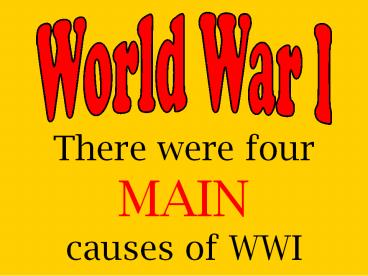Causes%20%20of%20%20World%20War%20I - PowerPoint PPT Presentation
Title: Causes%20%20of%20%20World%20War%20I
1
World War I
There were four MAIN causes of WWI
2
M
- Militarism
- glorifying military power and keeping an army
ready for war
3
A
- Alliances
- Agreements or promises to help or defend another
country
Europe in 1914 Triple Alliance Germany,
Austria-Hungary, and Italy Triple Entente
Great Britain, France, and Russia
4
I
- Imperialism
- the seizure of less powerful nations
British Empire, 1914
5
N
- Nationalism
- having pride in your country being loyal to
your nation
Otto von Bismarck and German Unification
6
The Balkan Peninsula Europes Powder Keg
New nations breaking away from the failing
Ottoman Empire
Numerous different ethnic groups with nationalist
sentiments aiming to establish new territories
Traditional power empires, like Austria-Hungary,
want to prevent new nations from competing for
power
7
(1) Serbia consisted of many ethnic Slavs and
wanted to establish a Slavic nation. They were
supported by Russia, another nation with many
Slavic peoples.
(2) Austria-Hungary opposed a Slavic nation,
fearing that it would cause Slavs living in
Austria to rebel. In 1908, Austria-Hungary
invaded and took over two Slavic nations, Bosnia
and Herzegovina.
8
(3) In 1914, while visiting the Bosnian capital,
Franz Ferdinand (the heir to the Austrian Throne)
and his wife were assassinated.
(4) Austria-Hungary declared war on Serbia one
month later.
9
(5) Russia, a Serbian ally, responded by sending
troops to the Austrian, Hungarian, and German
borders.
(6) In retaliation, Germany declared war on
Russia and on France, Russias ally.
10
(7) Great Britain, an ally to France and Russia,
responded by declaring war on Germany.
11
Technology Changes War
- Poison Gas Some gasses caused blindness or
severe blisters, others caused death by choking.
12
Technology Changes War
- Machine Gun killed waves of attackers worked
automatically fired 600 bullets/min.
13
Technology Changes War
- Tank could cross any type of terrain.
14
Technology Changes War
- Airplanes Were used for dropping bombs.
15
Technology Changes War
- Submarines Also called U-boats, used torpedoes
underwater or machine guns on deck to sink ships.
16
Conditions of Life as a Soldier
- Trench Warfare
17
Conditions of Life as a Soldier
- Trench Warfare
18
Trench Warfare
19
No Mans Land
20
Aerial view of opposing trench lines between Loos
and Hulluch, July 1917. German trenches at the
right and bottom, British at the top-left.
21
Conditions of Life as a Soldier
- Trench Warfare
22
Conditions of Life as a Soldier
- Trench Warfare
23
Trench Foot
- An infection of the feet caused by cold, wet and
unsanitary conditions. - In the trenches men stood for hours on end in
waterlogged trenches without being able to remove
wet socks or boots. - The feet would gradually go numb and the skin
would turn red or blue.
24
World War I A New Kind of War
25
Battle of Verdun
- In 1916 the Germans attacked the French near
Verdun. Each side lost more than 300,000 men. - The British, trying to help the French, attacked
Germany north of Verdun, in the Valley of Somme.
In the first day, each side lost over 500,000
men.
26
U.S. Enters the War
- Germans practiced unrestricted submarine warfare.
- A German U-boat sinks a British passenger ship
called the Lusitania. - 1,198 people were killed, including 128 U.S.
citizens.
27
U.S. Enters the War
- The United States intercepts the Zimmerman
Telegram, sent from Germanys foreign secretary
to Mexico. - The Germans offered to help Mexico reconquer
territory lost to the United States in the U.S.
Mexican War.
28
Russia Withdraws from the War
- Long term social unrest in Russia erupts in
revolution - March 1917 Czar Nicolas II was forced to
abdicate his throne - November 1917 Vladimir Lenin and his red army
the Bolsheviks overthrew the temporary government
- Five Year Plan farm land to peasants workers
gain control in the factories and to withdraw
Russia from the war (goal was economic
development) - Czar and his family were executed by the
Bolsheviks - In 1922, Russia was named the Union of Soviet
Socialists Republic (USSR). Capital was now
Moscow and Bolshevik party became Communist party

